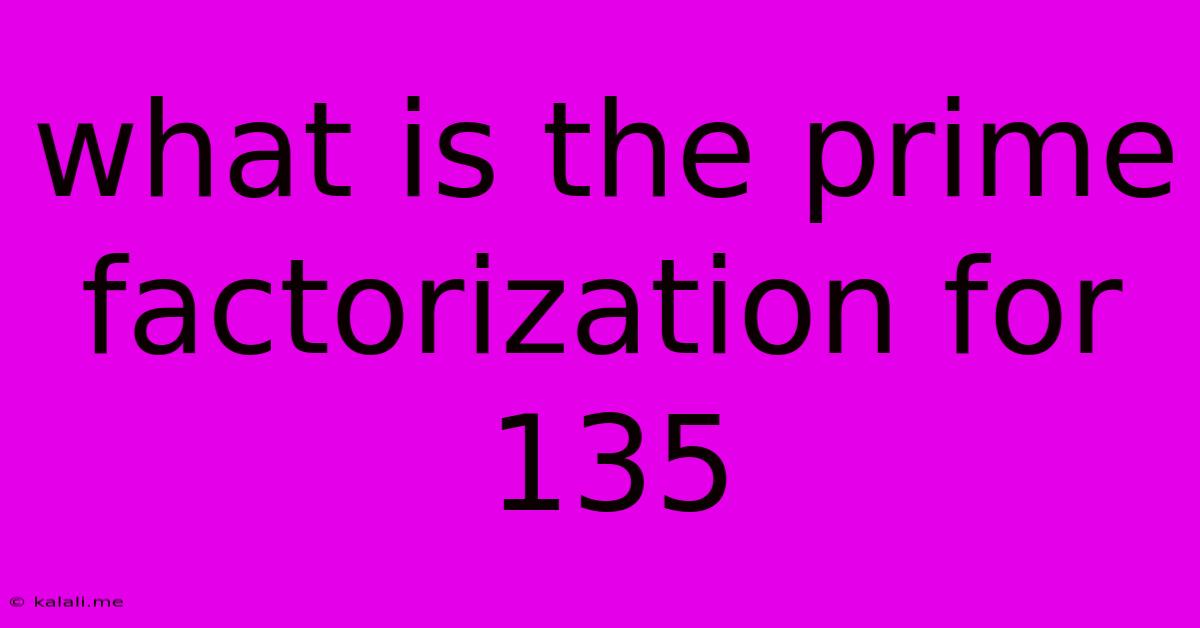What Is The Prime Factorization For 135
Kalali
Jun 14, 2025 · 2 min read

Table of Contents
What is the Prime Factorization for 135? A Step-by-Step Guide
Finding the prime factorization of a number is a fundamental concept in number theory. It's the process of breaking down a number into its prime number components – numbers divisible only by 1 and themselves. This guide will walk you through finding the prime factorization of 135, explaining the method and providing a clear understanding of the process. This is a great example to learn about prime factorization and understand its practical applications in mathematics.
Understanding Prime Numbers and Prime Factorization
Before diving into the factorization of 135, let's refresh our understanding of prime numbers. Prime numbers are whole numbers greater than 1 that have only two divisors: 1 and themselves. Examples include 2, 3, 5, 7, 11, and so on. Prime factorization, then, is expressing a composite number (a number that is not prime) as a product of its prime factors.
Finding the Prime Factorization of 135
We can find the prime factorization of 135 using a method called the factor tree. Here's how it works:
-
Start with the smallest prime number: We begin by dividing 135 by the smallest prime number, 2. Since 135 is not divisible by 2 (it's an odd number), we move to the next smallest prime number, 3.
-
Divide by prime numbers: 135 divided by 3 is 45. So, we can write 135 as 3 x 45.
-
Continue the process: Now we need to factorize 45. 45 is also divisible by 3, giving us 15. Therefore, we can write 45 as 3 x 15. Our factorization so far is 3 x 3 x 15.
-
Factor until you reach prime numbers: We continue factoring 15. 15 is also divisible by 3, resulting in 5. So, 15 becomes 3 x 5.
-
Final Factorization: Now, we have only prime numbers left: 3, 3, 3, and 5. Therefore, the prime factorization of 135 is 3 x 3 x 3 x 5, or 3³ x 5.
Expressing the Prime Factorization
The prime factorization of 135 can be written in two ways:
- Expanded form: 3 x 3 x 3 x 5
- Exponential form: 3³ x 5
Applications of Prime Factorization
Prime factorization isn't just a theoretical exercise; it has practical applications in various areas of mathematics, including:
- Simplifying fractions: Finding the greatest common divisor (GCD) of two numbers, which is crucial for simplifying fractions, is made easier using prime factorization.
- Solving equations: Prime factorization can assist in solving certain types of algebraic equations.
- Cryptography: Prime numbers play a crucial role in modern cryptography, forming the basis of many encryption algorithms.
In conclusion, the prime factorization of 135 is 3³ x 5. Understanding this process is a valuable skill in mathematics and has broader applications in various fields. By following the steps outlined above, you can confidently find the prime factorization of other numbers as well.
Latest Posts
Latest Posts
-
Isobars Are Contour Lines That Connect
Jun 14, 2025
-
Which Of The Following Statements About Divergent Boundaries Is True
Jun 14, 2025
-
The Outermost Layer Of The Suns Atmosphere
Jun 14, 2025
-
Sodium Sulphate And Barium Chloride Reaction
Jun 14, 2025
-
How Many Kilobytes Are In 1 Gb
Jun 14, 2025
Related Post
Thank you for visiting our website which covers about What Is The Prime Factorization For 135 . We hope the information provided has been useful to you. Feel free to contact us if you have any questions or need further assistance. See you next time and don't miss to bookmark.